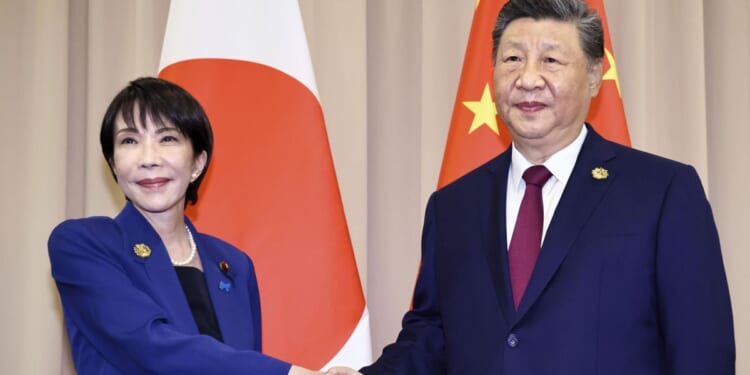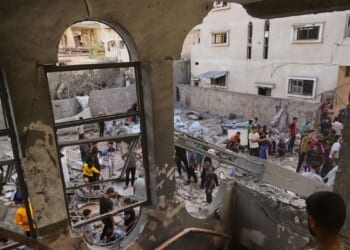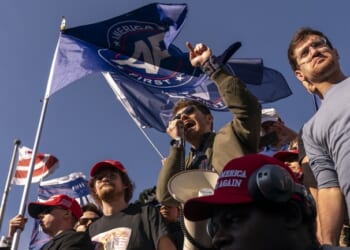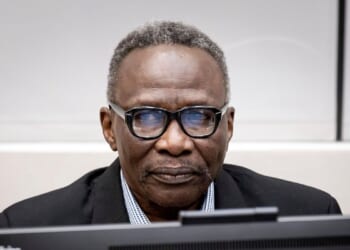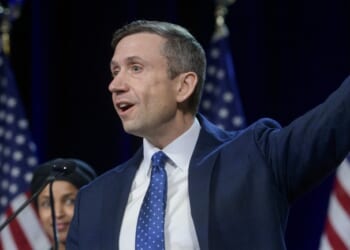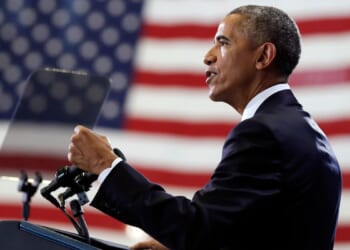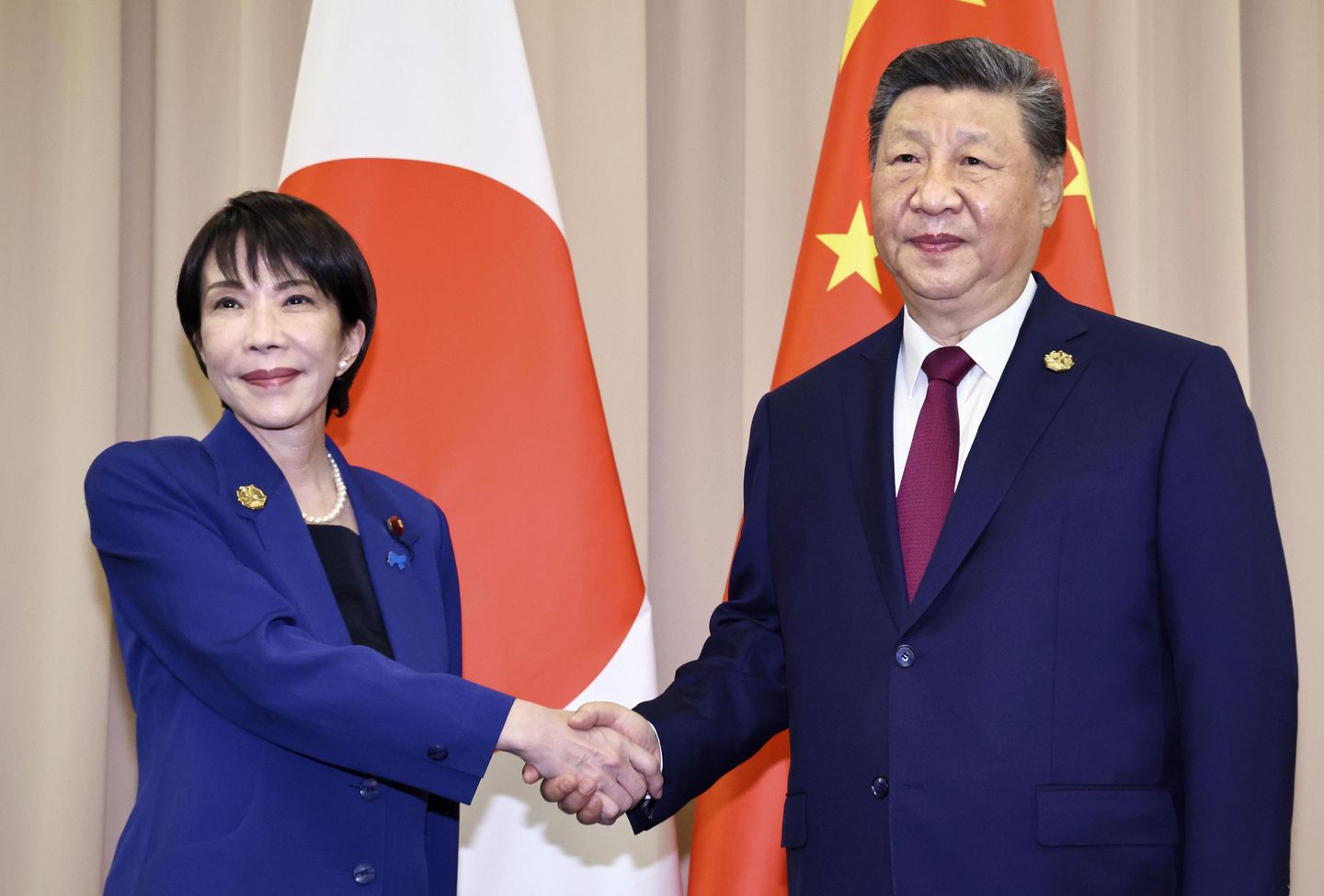
China’s propaganda drive against Japan over official comments about defending Taiwan has reached an unusually high level, with one outlet calling for the use of nuclear missile strikes to end alleged Tokyo “militarism.”
The Chinese Communist Party-controlled online outlet Guancha, Chinese for Observer, said in a Nov. 18 report that Japan under Prime Minister Sanae Takaichi is “recklessly resurrecting its militarism,” according to an English translation of the report.
The report said China’s “enemy state clause” and “historical grievances,” a reference to Japan’s World War II role in China, support waging a war against Japan.
“We have no psychological burden in launching a war against Japan, and it is also legally justifiable under international law,” the report said.
Three brigades of missiles armed with 72 nuclear warheads could destroy key military, industrial and infrastructure targets, the report said.
The report is part of what analysts say is China’s most highly charged propaganda campaign in decades, set into motion by Ms. Takaichi’s remarks to the Japanese legislature that a Chinese attack on Taiwan would pose a survival threat to Japan requiring military intervention.
In the latest broadside in the anti-Japan campaign, Chinese Foreign Minister Wang Yi said Sunday that Japan “crossed a red line” in suggesting military intervention against a Chinese attack on Taiwan.
“It is shocking that Japan’s current leaders have publicly sent the wrong signal of attempting military intervention in the Taiwan issue, said things they shouldn’t have said, and crossed a red line that should not have been touched,” Mr. Wang said.
If Japan persists in making mistakes, Mr. Wang said, “all countries and people who advocate justice have the right to reexamine Japan’s historical crimes and have the responsibility to resolutely prevent the resurgence of Japanese militarism.”
The issue of Taiwan was raised during a phone call Monday between President Trump and Chinese President Xi Jinping.
According to state media, Mr. Xi told Mr. Trump that China’s annexation of Taiwan “is an integral part of the postwar international order.”
State media said the discussion of Taiwan in the phone call was related to “certain countries” — Japan — provoking China on sovereignty issues.
Mr. Trump said on Truth Social that the call was a follow-up to the two leaders’ meeting in South Korea. He made no mention of Taiwan and announced plans to visit China in April and for Mr. Xi to visit the U.S. later next year.
The official Xinhua news agency said Mr. Trump called Mr. Xi “a great leader” and expressed that both nations were implementing all elements of an agreement made in Busan, South Korea.
Despite mounting Chinese economic and military threats against Japan, Ms. Takaichi, a conservative, has refused to back down in the dispute.
Japanese Defense Minister Shinjiro Koizumi said Sunday that Japan Self-Defense Forces were “steadily moving forward” with deployment of a medium-range, surface-to-air missile unit at a military base on Yonaguni, an island about 68 miles from Taiwan’s east coast.
Chinese Foreign Ministry spokeswoman Mao Ning said the missile deployment plan is a deliberate effort by Tokyo to stoke “military confrontation.”
“Right-wing forces in Japan are … leading Japan and the region towards disaster,” Ms. Mao told reporters, noting that the action is “extremely dangerous and should raise serious concerns among nearby countries and the international community,” especially in the context of Ms. Takaichi’s earlier remarks.
Mr. Koizumi said the missiles would protect the island.
“We believe that having this unit in place will actually lower the chances of an armed attack against our country,” he said.
Taiwanese Deputy Foreign Minister Francois Wu told lawmakers that Japan, as a sovereign nation, had the right to take steps to protect the security of its territory and pointed out Yonaguni’s proximity to Taiwan, Reuters reported.
“Japan’s strengthening of its relevant military facilities is basically helpful to maintaining security in the Taiwan Strait,” he said. “So, of course, this is helpful to our national interests as Japan has no territorial designs or hostility towards Taiwan.”
Meanwhile, the Chinese People’s Liberation Army Rocket Force produced a video that was posted on X and bearing the title “If war breaks out, this is my response!”
The video showed Chinese troops preparing for battle, along with warplanes flying and missiles on parade and being launched.
The Guancha report said the PLA Rocket Force currently fields three brigades of intermediate-range missiles, each equipped with a 200-kiloton warhead.
Included in the publication is a graphic showing the ring of destruction caused by a 200-kiloton warhead exploding in the center of Tokyo, with a caption saying the blast could kill 500,000 people and injure more than 1 million.
The report outlined three types of targets — military, industrial and infrastructure — to be attacked with nuclear strikes. The attacks would be justified despite China’s declared policy of not being the first to use nuclear weapons in a conflict, the report said.
Military targets would include the Defense Ministry headquarters, as well as airports and naval ports, including the U.S. Yokota Air Base north of Tokyo.
Six other army bases also would be struck with about 20 warheads.
The missiles to be used were not identified, but the report included a photo of DF-21 missiles that can be armed with nuclear and conventional warheads.
Next, the report said, nuclear attacks would be carried out against industrial targets to destroy war potential. The targets include Toyota, Mitsubishi Heavy Industries, Kawasaki Heavy Industries, Nissan, Toshiba, East Japan Steel and Nippon Steel. Electronics factories of Sony and Panasonic also would be hit with nuclear warheads. All would be struck with a total of 32 warheads, the report said.
Nuclear attacks on infrastructure, requiring 20 warheads, would include the ports and nuclear power plants, oil refineries and dams.
“Once those 72 nuclear warheads are deployed, Japan can be completely deindustrialized and demilitarized and will be barred from any ambitions for decades to come,” the report concluded.
“As for the resulting humanitarian disaster and abnormal population decline, one can only say that the Japanese people’s understanding is commensurate with their suffering.”
The report included a disclaimer stating that the views expressed in the report were those of a contributor, identified as Zhang Zhonglin.
However, Chinese state censorship is controlled, and nothing that is published online or in other outlets is permitted without Chinese Communist Party approval.
Rick Fisher, a China affairs expert with the International Strategy and Assessment Center, said the Trump administration needs to launch a political warfare and counterpropaganda campaign against the Chinese effort to target Japan.
“China’s psychotic threat-mongering requires calling out and censure by appropriate U.S. officials in coordination with allies and partners when they are attacked,” Mr. Fisher said.
“China’s unleashing of explicit nuclear threats against Japan, such as the Guancha article, deserves condemnation at the United Nations Security Council and more explicit punishment, such as the expulsion of Chinese citizens from the cities they threaten with nuclear attack,” Mr. Fisher said.
The U.S. government has long feared that through the Chinese-owned video app TikTok, China is weaponizing its own social media and is now using the X platform to wage virtual nuclear war against America’s allies, and it will soon do so against the U.S., he said.
China’s virulent campaign against Japan, a key American ally in the Pacific, is a flagrant CCP abuse of membership privileges in the civilized world, Mr. Fisher said.
“It is time to enumerate those privileges and to deny them, where possible, to make clear to the Chinese people that the CCP is the enemy of civilization,” he said.
The Guancha report is not the first time China or its state media have disclosed plans for nuclear missile attacks.
In 2013, the CCP-affiliated Global Times published a report that detailed PLA plans to conduct submarine-launched nuclear missile attacks against U.S. cities.
That report stated that JL-2 missiles fired from Chinese submarines would strike cities including Seattle, San Francisco, Los Angeles and Chicago.
It included a graphic on the destruction from a nuclear attack on Seattle in three-day phases with 20 warheads, causing blast destruction and radioactivity deaths.
“Based on the actual level of China’s 1 million tons TNT equivalent small nuclear warhead technology, the 12 JL-2 nuclear missiles carried by one Type 094 nuclear submarine could cause the destruction of 5 million to 12 million people, forming a very clear deterrent effect,” the report said.
In 1996, PLA Gen. Xiong Guangkai, the military intelligence chief, suggested that the PLA was set to attack the United States with nuclear weapons.
Gen. Xiong told a former U.S. defense official that the U.S. would not defend Taiwan because it cares more about Los Angeles than Taipei. The remark was reported to current officials at the time as a nuclear threat.
Gordon Chang, a China expert with the Gatestone Institute, said the Japanese Defense Ministry disclosed Nov. 17 that the Pentagon had withdrawn a battery of Typhon medium-range missiles from the U.S. Marine Corps air station at Iwakuni that was deployed for a U.S.-Japanese military exercise.
China had complained that the missile deployment threatened regional security.
Mr. Chang said the missile withdrawal during a confrontation between China and Japan has set off the Chinese propaganda machine, as Beijing promotes a narrative that the withdrawal of the Typhon battery shows Washington is abandoning Tokyo.
“Nothing could be further from the truth, but the U.S. Department of War should have foreseen that China would try to score points by making it look as if the U.S. had just caved in the face of Beijing’s pressure,” he said.
“When the risk of war with China has never been higher, this is absolutely the worst possible moment for the U.S. to have removed important weapons from Japan,” Mr. Chang said.

